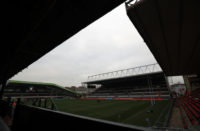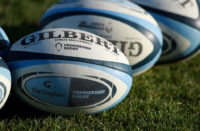
Imagine a Great Britain Sevens team for Rio 2016 picked, using a similar model to the Lions, from the best rugby union talent there is in England, Wales and Scotland.
Here's a preliminary stab at selection. How about a best of British Sevens squad selected from George North, Tom Croft or Tim Visser as props, Tom Youngs, Jonathan Davies or Justin Tipuric at hooker, Ben Youngs or Danny Care at scrum-half, Stuart Hogg or Freddie Burns at fly-half, and Christian Wade, Alex Cuthbert or Tom Varndell on the wings?
It is an outfit with such pace, power and footballing skill that they would have to be in the chase for Olympic gold, irrespective of whether New Zealand add Sonny Bill Williams and Benji Marshall to their Sevens roster.
Then ask yourself this question: Would you back the current specialist England, Wales or Scotland Sevens teams playing in the HSBC World Sevens Series – or a combination of the best of them – to beat the 15-a-side Test stars named above?
Hugh McHardy, the former Scotland B, Glasgow, Rosslyn Park and Harlequins scrum-half, and an accomplished Sevens player before the turn-of-the-century, suggested to me recently that the specialists would not stand a prayer.
Even with a modicum of training – weeks rather than months – McHardy, who has played in more Sevens tournaments than most people have had breakfast, contends that the adjustments in conditioning would soon be addressed. His view is that after that the superior footballing ability of the 15-a-side stars would give them the beating of the Sevens pros every time.
If McHardy is right – and I believe he is on the money – it is high time that the RFU, the WRU and the SRU stopped dragging their feet and announced a Lions-style selection and training strategy aimed at fielding a Great Britain side capable of winning Olympic gold. (N.B. England, Wales, Scotland because it is believed that players from Northern Ireland will not be involved).
Knocking New Zealand off their perch of Sevens domination with an Olympic title at stake will take a concerted effort. It requires clear thinking and co-operation between the national unions, clubs and regions in the three jurisdictions, and, naturally, it does not preclude Sevens specialists forcing their way into the squad.
As for an English candidate to join the Great Britain coaching team and help plan that strategy, Mike Friday is the man for the job.
Friday is the one candidate for the Great Britain and England Sevens coaching posts whose track record is better than that of any other English coach. However, whether he gets either job following Ben Ryan's exit from the England post is far from certain, due mainly to the personality politics and petty jealousies which fester in the corridors of Twickenham's elite rugby department.
 There is a chance that the outspoken Friday could be passed over for the England job, with either Simon Amor or Ben Gollings getting the nod from Rob Andrew, the RFU's professional rugby director. This would fly in the face of the tried and tested policy of picking a coach based on his record, and experience, and would be a travesty with the Olympic Sevens in Rio only three years away.
There is a chance that the outspoken Friday could be passed over for the England job, with either Simon Amor or Ben Gollings getting the nod from Rob Andrew, the RFU's professional rugby director. This would fly in the face of the tried and tested policy of picking a coach based on his record, and experience, and would be a travesty with the Olympic Sevens in Rio only three years away.
Great England Sevens players that they were, neither Amor nor Gollings have coached men's Sevens at international level, whereas Friday has – and with distinction, be it with England or Kenya.
Another candidate was former South African Sevens coach Paul Treu, but thankfully he is just been appointed by Kenya as Friday's replacement. Treu has a fine track record but, frankly, if England is incapable of appointing a Sevens coach from its own ranks – especially one as good as Friday – we may as well give up.
There have also been suggestions that, having guided England into the era of full-time professional Sevens with some success, Ryan is a leading contender for the Great Britain coaching role. I have nothing against Ryan, but would not back his candidacy over Friday's.
Ryan contends that the Sevens landscape was in the throes of change when he succeeded Friday as England coach, with the Premiership clubs withdrawing most of their players from the Sevens stage.
However, it is also true that rather than press the RFU to reach an accommodation with the Premiership clubs to release talented youngsters for Sevens – as Friday did – Ryan opted to contract Sevens specialists and proceed on a path which left little or no connection between his squad and the elite 15-a-side game.
The separate development Ryan set in train between Sevens and 15s was the wrong path. Having watched great former All Blacks from Buck Shelford, David Kirk and Zinzan Brooke at the Hong Kong Sevens in the Eighties, through to Jonah Lomu and Christian Cullen in the Nineties – as well as seeing the sublime David Campese strut his stuff on the Sevens stage – my view has always been that most of the skills in the two versions of our code are transferable and therefore mutually beneficial.
Friday agrees, and his mantra was – and is – that anyone who joined his England Sevens teams returned to 15-a-side at their clubs as better players, 2003 World Cup-winner Josh Lewsey among them.
Which brings us back to Rio, and why, if Great Britain are serious about going for gold, Mike Friday has to be involved.


























